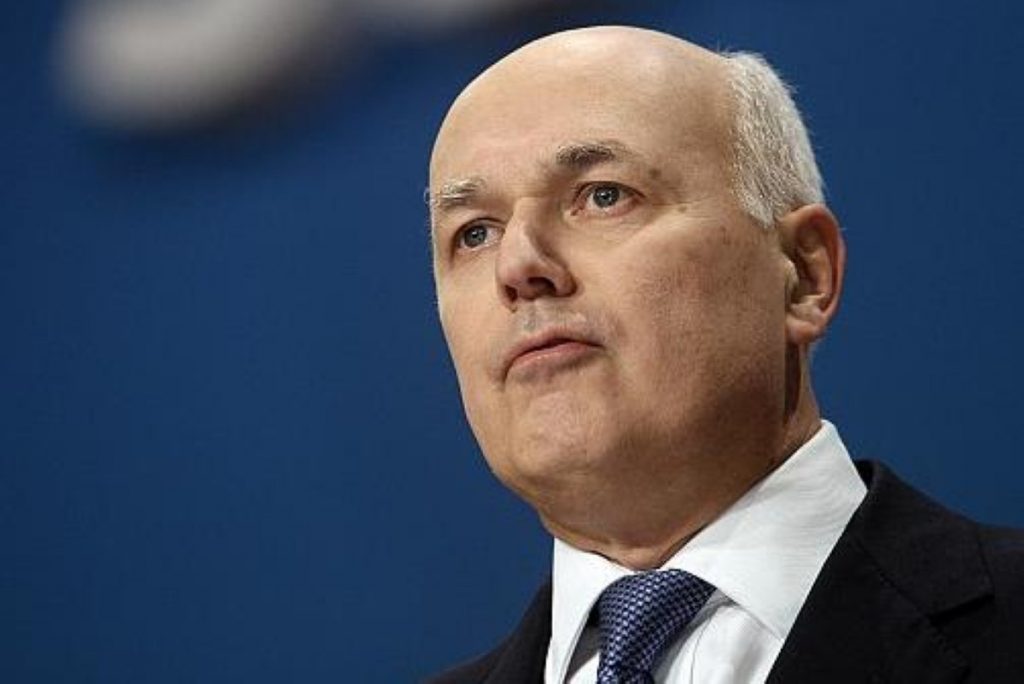Running on fumes: Iain Duncan Smith’s universal credit ‘throwing good money after bad’
Iain Duncan Smith's faith in universal credit's ability to deliver value for money just doesn't stand up to scrutiny.
The latest update from Margaret Hodge, chair of the Commons' public accounts committee, is despairing about the "unacceptably poor management" of universal credit, which she says has "wasted time and taxpayers' money".
Hers is a damning assessment of an ambitious reform that was always going to be complex. All three of Westminster's mainstream parties support universal credit, but none of them would want to be associated with the enormous mess made of its implementation by the Department for Work and Pensions (DWP).
Eventually seven million claimants will be collecting their benefits using a digital service which is currently in the very early stages of development.
Instead of just waiting for the digital system to be developed, the DWP chose to test its effectiveness by using existing, clunkier systems.
At every stage universal credit has been knocked back. November 2013 saw the Major Projects Authority put it back to 'square one', triggering the twin-track approach.
Then came 2014, a terrible year for universal credit. The senior civil servant in charge of the reform suffered from ill-health and was only able to work for one day a week, before leaving in the autumn – when the programme director retired, too.
It was around this time that the Treasury finally approved its strategic outline business case for the reform, having previously only been willing to offer money in small increments.
But while the Treasury is becoming more optimistic, none of its major suspicions have been fully allayed. Full rollout has been put back until December 2019, far later than originally anticipated. And, astonishingly, there are still no contingency plans in place for any further delays to the digital service.
The stakes are high, and this is your money being gambled. Taxpayers are set to lose £2.3 billion from the net value of the programme if there's just a six-month delay. In that scenario the only fallback would be the existing system, but making it ready on time would cost a further £2.8 billion.
There are just 18 months to go until the digital system begins its rollout to claimants nationwide. April 2016 is very close – and universal credit now appears even more complicated and difficult than ever.
Here's Hodge's verdict in full:
"The department's unacceptably poor management of this programme has wasted time and taxpayers' money, with a staggering £600 million spent in four years just to get to the first stage of business case sign-off.
"Now the department is throwing good money after bad by introducing a short-term fix with no adequate plan for delivery, insufficient skills and unclear milestones to measure progress against. The transfer of all claimants on to universal credit will not now be completed until after the end of 2019.
"Given its track record, the department needs to get its act together quickly if it is to deliver a system that vulnerable benefit claimants can rely on."
The media might paint IDS as being the sole person in charge of this, but the complex hierarchy within the DWP is actually just as important in securing its rollout.
A big part of the problem has been the 'fortress mentality' of those backing universal credit. IDS and his acolytes are have been just as zealous in pursuing their reforms as Michael Gove's remorseless pursuit of his academies reforms in the Department for Education.
As MPs on the public accounts committee noted: "The programme board has noted a need for papers it receives to have a sharper focus on facts, as opposed to advocacy."
It looks like IDS' ideological determination to make work pay has been getting in the way of universal credit's implementation – for which we are all footing the bill.





-01.png)